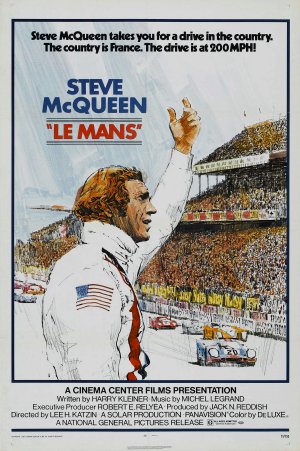
LE MANS
US, 1971, 108 minutes, Colour.
Steve Mc Queen.
Directed by Lee H. Katzin.
Le Mans is Steve Mc Queen's film on racing cars. It is a semidocumentary with a minimal (and weak) story. The action of the film takes place over the two days of the Le Mans rally.
The building of atmosphere is excellently done and the audience is drawn into the spirit of Le Mans with spectacular footage of the crowds arriving and a T.V. style coverage of the area. The racing sequences are excellently done and offer quite a display of techniques for communicating the sense of speed, daring and competition. The accident scenes are spectacular and give no illusions as to the destructive force of crashes at high speed. The film is a monument to the variety of today's expert technology and our absorption by technological achievement. Other films about racing have focussed on the 'human interest' side of racing as well - Howard Hawk's Red Line 7000, Frankenheimer's Grand Prix and the interesting story about people and driving, Winning, with Paul Newman and Joanne Woodward.
1. Was this just a story? An action picture? A semi-documentary? Why did Steve Mc Queen make this film so lavishly?
2. How was the atmosphere of Le Mans built up and sustained throughout the whole film? You were meant to feel as if you had really been there, not merely watching the race. but absorbing the spirit, the background and the atmosphere. Was the film successful in this? How?
3. Did you get to understand Michael Delaney well ? what made him the kind of personality he was, why he drove ? did you find out anything more than "a man's got to do what he can do"?
4. Was the thrill and exhilaration of fast driving communicated? What screen techniques were used for this?
5. Was the spirit of difficult competitive driving communicated? How?
6. What was the impact of the accident sequences? They were spectacular, but did you find them too spectacular, too much larger than life and, therefore, great to look at but not really frightening? Or were they frightening?
7. The women in the story were not as involved in the risks of fast racing as their husbands were. Why do men want to compete and risk their lives trying to go faster than others? what do they achieve? Is it worth it?
8. What does a film like this show about twentieth century values adventure, excitement, sense of technology (the expertise and finesse of the engineers and mechanics), sense of exploration and achievement? (How effective was the silence, except for the heartbeats, at the beginning of the race?)
9. Why do people like to watch the cars in such great numbers? And why are films like this so popular?